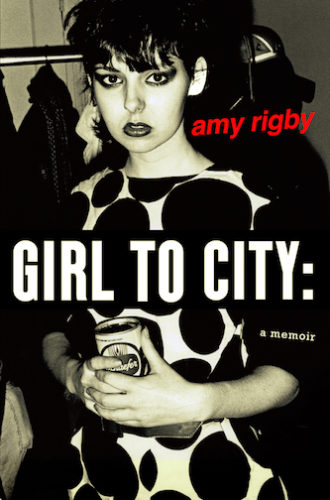Music Interview: Talking to Rocker Amy Rigby — Musician Turned Author
By Blake Maddux
“I’ve put out records by myself before, but this is like 10 times the work!”

Born Amelia McMahon in Pittsburgh, the artist known as Amy Rigby has lived a captivating rock ‘n’ roll life that belies its modest scale and her need to temp for income and song material.
Rigby has been in bands that never headlined major venues but opened at them for Indigo Girls, Urge Overkill, Los Lobos, and The Waterboys. Although they weren’t publicity hounds or the subjects of cover stories, their output received praise from publications such as the Los Angeles Times and the Austin Chronicle.
Rigby’s first solo album, Diary of a Mod Housewife, sold an unexceptional 20,000 copies upon its 1996 release but was ranked #8 in Village Voice’s year-end Pazz & Jop poll and SPIN named her Songwriter of the Year.
On the domestic front, the former Ms. McMahon was married to Will Rigby of The dB’s, an influential power pop band who opened for R.E.M. in 1984 and 1987, and has been the legal and musical partner of Wreckless Eric, a British pub/punk rocker who released the classic single “Whole Wide World” in 1978, for more than a decade. (Here is the 2013 interview that I did with them.)
Thanks to the October 8 publication of her memoir Girl To City, Rigby is now – in addition to an artist and a musician – an author.
In an interview with The Arts Fuse ahead of her return to Atwood’s Tavern on Sunday, Rigby compared the difficulties of working independently in two artistic media: “I’ve put out records by myself before, but this is like 10 times the work!”
The Arts Fuse: You write that the idea of writing a memoir first came up around the time of 1996’s Diary of a Mod Housewife. How did Girl To City take shape between then and its completion?
Amy Rigby: I kind of dashed off a proposal for this agent back then. It was basically about how I didn’t have time to write a proposal! I was imagining, rather than a memoir, a looking-back, more of a here-are-the-things that are happening to me now. That turned into what I called an online diary, because the word “blog” had not been invented yet. I started that in ’99. The first one that I wrote was about being on tour opening for Warren Zevon. I was trying to throw in those kind of mundane details that I have enjoyed in other people’s books since Ian Hunter wrote Diary of a Rock ‘n’ Roll Star. That book was really huge to me. It felt for the first time that I’d gotten a sense of what real life was like for a musician. That they didn’t just start existing on stage, and they had this whole other life going on. That’s kind of what I was trying to do with my online diary. It was in 2009, when I was living in France, that I really decided to map it all out. I drew out this timeline and tried to mark what had happened when and where. Then I wrote a really long draft that went through a couple revisions.
AF: How were its parameters established?
Rigby: The book always had to end with Mod Housewife, the aftermath, and when I left New York. I love reading other people’s memoirs and autobiographies. I find that I’m captivated by the first two-thirds usually and, when the last part becomes a litany of all their accomplishments for the last 20 years, these books always lose me. It just becomes like a CV or something. I just didn’t want that. I wanted it to be kind of a coming-of-age story, that its arc left room for another book. I really didn’t want to finish it with a feeling like, ‘This is it.’”

Rocker Amy Rigby — working in two artistic media. Photo: Chris Sikich.
AF: How did you come up with the terse but inviting title?
Rigby: Oh my god, titles are so hard! For many years, I had called it Summer of My Wasted Youth ’cause it felt like that song had the feeling that I wanted the book to have. During the two-year period when I had an agent, she was pitching it with that title. But I never felt that it was accurate. So I came up with like a thousand titles and I just narrowed it down to that. Also, if you’ve lived in the New York area ever, that Daily News headline, “FORD TO CITY: DROP DEAD” was so iconic. I wasn’t sure if it would make sense to people who don’t know that headline, but it still sort of says what the book is.
AF: In what ways was writing the book a pleasure, a chore, a burden, etc.?
Rigby: Once I started writing, I discovered things about the past that felt so valuable to me. I kept reminding myself of that when it felt like I would never be able to complete it. I wanted to find a publisher, and that was a really hard process. Then I had to give up on that and just do it myself — that part was kinda hell. I would just start screaming because I felt like I’d spent so many years working on it. I couldn’t give up on it now! But the actual writing part I love. I still write a blog pretty regularly.
AF: Are there any relevant episodes or people who were left out because they are simply too painful or embarrassing, either to you or to others?
Rigby: No, and I hope that doesn’t like bite me in the ass (laughing)! Really, even dealing with people who were sort of like dark spots in my life, I still felt like I now had enough distance – or found it in the process – to write about them with love and appreciation. Maybe I kind of blurred some details about a couple people and didn’t use their names, but I didn’t really censor anything.
Blake Maddux is a freelance journalist who regularly contributes to the Arts Fuse, the Somerville Times, and the Beverly Citizen. He has also written for DigBoston, the ARTery, Lynn Happens, the Providence Journal, The Onion’s A.V. Club, and the Columbus Dispatch. A native Ohioan, he moved to Boston in 2002 and currently lives with his wife and one-year-old twins–Elliot Samuel and Xander Jackson–in Salem, Massachusetts.
